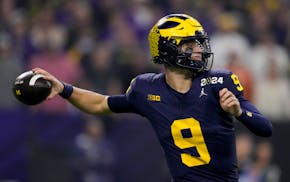FORT MYERS, Fla. – If the state of Mississippi develops a shortage of ducks and deer, blame Derek Falvey and Thad Lavine.
When the new Twins bosses discussed trades of second baseman Brian Dozier this winter, Dozier sought refuge. He and his wife would head to their cabin two hours from their home in Hattiesburg, Miss., to clear heads and thin herds.
"I don't get service out there," Dozier said. "I guess that became a good thing. Any time something seemed to be getting close, we'd head out there for three or four days and go hunting."
After hitting 42 home runs in 2016, Dozier became the subject of hypotheticals as well as rumors. When you lose 103 games and your best player has a career year, do you trade him while he's at peak value to rebuild your pitching staff, or hang on and hope he can repeat?
The Twins' new front office, led by Falvey and Lavine, settled on the latter. When the Dodgers traded pitching prospect Jose DeLeon for Rays second baseman Logan Forsythe, the Twins found themselves without realistic trade partners.
The Twins were stuck keeping their best player, who has progressed from 18 to 23 to 28 to 42 home runs in his four full seasons.
"You could say the numbers speak for themselves," he said. "But I always try to find a way to get better. Every year, try to take your game to the next level, however you can. It could be the smallest of details, it could be more power, whatever.
"I say this every year, but I want to steal more bases. I want to take my baserunning to the next level."
Dozier stole 18 bases last year. His career best is 21. If he dramatically improved, he would have a chance to become the first Twin ever to hit 30 home runs and steal 30 bases in the same season.
What's most fascinating about Dozier, though, is his approach at the plate. He is capable of hitting almost any pitch over the left field fence. He is also capable of falling into slumps when pitchers take advantage of that mind-set.
He wasted the first two months of the 2016 season, then hit 35 home runs in the last 92 games of the season, batting .291 during that time.
Traditional hitting gurus in and around the organization think he improved because he became willing to punish pitches on the outside part of the plate, even when that meant hitting the ball to right-center. Dozier spoke of trying to hit every pitch over the center field fence but being willing to embrace his inner pull hitter.
"What changed for me was in 2013, I finally got my mind off what everyone said for so many years that you have to do," Dozier said. "Fastball away, hit it the other way. Take pitches back up the middle. You get so caught up in, if I can say it, the 'old-school way,' that it limits you. You have to recognize your strengths as an offensive player. If it's pulling the ball, then just pull the ball. I've hit homers on pitches 6 inches off the plate. Training the path of my swing in order to cover more than 17 inches and still get the ball out in front."
Now that he's proved he can do the biggest thing in baseball, Dozier is emphasizing the minute.
He was shocked that last year's team could lose 103 games. "I was," he said. "We got ourselves in a rut that we just couldn't get out of. Everyone in here says 'clean slate,' but I don't think of it like that. Yes, it's a new year, but I want to make sure we understand why we lost 103 games.
"It's not because other people were more talented than us. It's doing the little things to win close games. I don't want us to turn the page. I want us to learn from it."
Jim Souhan's podcast can be heard at MalePatternPodcasts.com. On Twitter: @SouhanStrib. • jsouhan@startribune.com

Souhan: Wolves fans made Game 1 special. Now bring on Game 2.

Souhan: Should Vikings even consider McCarthy in NFL draft?

Souhan: NAW erases Suns' lead, Game 1 advantage with big performance

Souhan: This is KAT's chance to prove Flip Saunders was right


